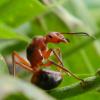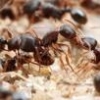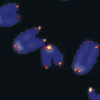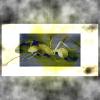- Formiculture.com
- Forums
- Gallery
- Members
- Member Map
- Chat

Ant domestication
Started By
AdamL
, Nov 12 2019 12:01 PM
24 replies to this topic
#1
 Offline
-
Posted November 12 2019 - 12:01 PM
Offline
-
Posted November 12 2019 - 12:01 PM
Do you think domestication of ants is possible like have a colony that could forage out side of a out world or the colony recognizing you as a friend.
#2
 Offline
-
Posted November 12 2019 - 12:08 PM
Offline
-
Posted November 12 2019 - 12:08 PM
Insects are not able to comprehend the idea of a "friend" outside of considering members of a communal species a "friend." The only insects I can consider to be domesticated are Drosphila sp. fruit flies since they are a model organism; otherwise, I do not believe insects to be capable of domestication such as cats, dogs, various rodents, etc. They have no behaviors to work with or alter that would change or benefit keeping. You can use barricades to prevent them from going places, but ultimately they will not retain information like our current domesticated animals: they will always act the same way if not impeded. With that being said, you can definitely free range your ants (as long as they are native NOT invasive), just make sure the queen is unable to relocate.
- Martialis and Pumpkin_Loves_Ants like this
#3
 Offline
-
Posted November 12 2019 - 12:37 PM
Offline
-
Posted November 12 2019 - 12:37 PM
#4
 Offline
-
Posted November 12 2019 - 12:46 PM
Offline
-
Posted November 12 2019 - 12:46 PM
Ok that's to bad
#5
 Offline
-
Posted November 12 2019 - 9:36 PM
Offline
-
Posted November 12 2019 - 9:36 PM
Insects are not able to comprehend the idea of a "friend" outside of considering members of a communal species a "friend." The only insects I can consider to be domesticated are Drosphila sp. fruit flies since they are a model organism; otherwise, I do not believe insects to be capable of domestication such as cats, dogs, various rodents, etc. They have no behaviors to work with or alter that would change or benefit keeping. You can use barricades to prevent them from going places, but ultimately they will not retain information like our current domesticated animals: they will always act the same way if not impeded. With that being said, you can definitely free range your ants (as long as they are native NOT invasive), just make sure the queen is unable to relocate.
Silkworms are the only completely domesticated insect. The agricultural species does not exist in the wild anymore. Insects may be domesticated, though not in the traditional fashion.
#6
 Offline
-
Posted November 14 2019 - 6:55 PM
Offline
-
Posted November 14 2019 - 6:55 PM
Insects are not able to comprehend the idea of a "friend" outside of considering members of a communal species a "friend." The only insects I can consider to be domesticated are Drosphila sp. fruit flies since they are a model organism; otherwise, I do not believe insects to be capable of domestication such as cats, dogs, various rodents, etc. They have no behaviors to work with or alter that would change or benefit keeping. You can use barricades to prevent them from going places, but ultimately they will not retain information like our current domesticated animals: they will always act the same way if not impeded. With that being said, you can definitely free range your ants (as long as they are native NOT invasive), just make sure the queen is unable to relocate.
Silkworms are the only completely domesticated insect. The agricultural species does not exist in the wild anymore. Insects may be domesticated, though not in the traditional fashion.
I had completely forgotten about them, haha. Yes, this was the first and only domesticated insect. Bombyx mori was the new species title given to them since they had changed so much from their wild counterpart called Bombyx mandarina.
#7
 Offline
-
Posted November 14 2019 - 10:57 PM
Offline
-
Posted November 14 2019 - 10:57 PM
Domestication of an animal doesn't necessarily mean that we're making them more friendly or entirely changing their behavior. It just means that we have meaningfully changed the species through selective reproduction to better suit our needs.
That's why many argue honey bees are domesticated. Honey bees are far more willing to let you take apart their hives than any other hymenopteran I know of. We have kept them for thousands of years, and modern beekeepers have great control over which queen produces for their colonies. If they are not domesticated, they are on their way.
I think it's just a matter of time. With enough time, you can change the behavior, or really any characteristic, of any species. I honestly would argue you can do this more so with insects than mammals. Their behaviors are almost entirely genetically-based, meaning it would be much easier to choose for behaviors since nurture is not playing a role like it does in mammals. Only nature.
They have no behaviors to work with or alter that would change or benefit keeping.
Are you sure? I mean, not to be rude, but I could think of half a dozen off the top of my head. Change aggression, appetite, growth rate, stress sensitivity, etc. Manipulating these behaviors would greatly change the experience of keeping that species.
As with any domestication event, it will take a great amount of time. Nobody currently alive will see domesticated ants. I do believe it is possible, however.
- OhNoNotAgain likes this
Currently Keeping:
Trachymyrmex septentrionalis
Pheidole pilifera
Forelius sp. (Monogynous, bicolored) "Midwestern Forelius"
Crematogaster cerasi
Pheidole bicarinata
Aphaenogaster rudis
Camponotus chromaiodes
Formica sp. (microgena species)
Nylanderia cf. arenivega
#8
 Offline
-
Posted November 15 2019 - 3:13 AM
Offline
-
Posted November 15 2019 - 3:13 AM
Domestication of an animal doesn't necessarily mean that we're making them more friendly or entirely changing their behavior. It just means that we have meaningfully changed the species through selective reproduction to better suit our needs.
That's why many argue honey bees are domesticated. Honey bees are far more willing to let you take apart their hives than any other hymenopteran I know of. We have kept them for thousands of years, and modern beekeepers have great control over which queen produces for their colonies. If they are not domesticated, they are on their way.
I think it's just a matter of time. With enough time, you can change the behavior, or really any characteristic, of any species. I honestly would argue you can do this more so with insects than mammals. Their behaviors are almost entirely genetically-based, meaning it would be much easier to choose for behaviors since nurture is not playing a role like it does in mammals. Only nature.
They have no behaviors to work with or alter that would change or benefit keeping.
Are you sure? I mean, not to be rude, but I could think of half a dozen off the top of my head. Change aggression, appetite, growth rate, stress sensitivity, etc. Manipulating these behaviors would greatly change the experience of keeping that species.
As with any domestication event, it will take a great amount of time. Nobody currently alive will see domesticated ants. I do believe it is possible, however.
I am very sure. All of those can be changed in the short run, but it's never going to be permanent without selective breeding. You can't selectively breed your own ants for generations to get the specific looks or behaviors you want. There are very few species that mate in nest and very few people will ever be able to work with them. These ants are the only ones I believe would have a chance at becoming domesticated. I only know of a single guy who has mated some sort of Pogonomyrmex sp. in captivity.
Most bee hives let you mess with their nests because they're smoked before working on their nest or you have a bee suit which reduces the chances of being stung so you mess with them anyways. Even then, they don't really let you mess with their nests, they still try to sting you. As far as I am aware, bees are not selectively bred. Most of the time bee keepers wait for queens to emerge from their chambers (easy to see which larval chamber is a queen) and then are thrown into a little container and are made to mate with a drone. They are unable to determine if the queen/drone has qualities they like, just enough to mate them. I don't know enough about bee keeping to say for absolute, but this is what I speculate and have heard from a couple friends. (I could always take the beekeeping course on campus, but it's always full)
- TennesseeAnts likes this
#9
 Offline
-
Posted November 15 2019 - 6:39 AM
Offline
-
Posted November 15 2019 - 6:39 AM
You do know that if the ants want to move and the queen does not fit they will MAKE her fit - at whatever cost. Even if it means relocating her in multiple parts.With that being said, you can definitely free range your ants (as long as they are native NOT invasive), just make sure the queen is unable to relocate.
I know of several occasions where people tried this and the workers decided to cut up the queen.
Edited by Serafine, November 15 2019 - 6:40 AM.
- TennesseeAnts, Manitobant and OhNoNotAgain like this
We should respect all forms of consciousness. The body is just a vessel, a mere hull.
Welcome to Lazy Tube - My Camponotus Journal
#10
 Offline
-
Posted November 15 2019 - 6:46 AM
Offline
-
Posted November 15 2019 - 6:46 AM
Domestication of an animal doesn't necessarily mean that we're making them more friendly or entirely changing their behavior. It just means that we have meaningfully changed the species through selective reproduction to better suit our needs.
That's why many argue honey bees are domesticated. Honey bees are far more willing to let you take apart their hives than any other hymenopteran I know of. We have kept them for thousands of years, and modern beekeepers have great control over which queen produces for their colonies. If they are not domesticated, they are on their way.
I think it's just a matter of time. With enough time, you can change the behavior, or really any characteristic, of any species. I honestly would argue you can do this more so with insects than mammals. Their behaviors are almost entirely genetically-based, meaning it would be much easier to choose for behaviors since nurture is not playing a role like it does in mammals. Only nature.
Are you sure? I mean, not to be rude, but I could think of half a dozen off the top of my head. Change aggression, appetite, growth rate, stress sensitivity, etc. Manipulating these behaviors would greatly change the experience of keeping that species.They have no behaviors to work with or alter that would change or benefit keeping.
As with any domestication event, it will take a great amount of time. Nobody currently alive will see domesticated ants. I do believe it is possible, however.
You do know that if the ants want to move and the queen does not fit they will MAKE her fit - at whatever cost. Even if it means relocating her in multiple parts.I know of several occasions where people tried this and the workers decided to cut up the queen.With that being said, you can definitely free range your ants (as long as they are native NOT invasive), just make sure the queen is unable to relocate.
My old Formica neogagates colony took the queen's legs off to relocate her.
My Main Journal | My Neivamyrmex Journal | My Ant Adoption | My YouTube
Join the TennesseeAnts Discord Server! https://discord.gg/JbKwPgs
#11
 Offline
-
Posted November 15 2019 - 1:27 PM
Offline
-
Posted November 15 2019 - 1:27 PM
Domestication of an animal doesn't necessarily mean that we're making them more friendly or entirely changing their behavior. It just means that we have meaningfully changed the species through selective reproduction to better suit our needs.
That's why many argue honey bees are domesticated. Honey bees are far more willing to let you take apart their hives than any other hymenopteran I know of. We have kept them for thousands of years, and modern beekeepers have great control over which queen produces for their colonies. If they are not domesticated, they are on their way.
I think it's just a matter of time. With enough time, you can change the behavior, or really any characteristic, of any species. I honestly would argue you can do this more so with insects than mammals. Their behaviors are almost entirely genetically-based, meaning it would be much easier to choose for behaviors since nurture is not playing a role like it does in mammals. Only nature.
Are you sure? I mean, not to be rude, but I could think of half a dozen off the top of my head. Change aggression, appetite, growth rate, stress sensitivity, etc. Manipulating these behaviors would greatly change the experience of keeping that species.They have no behaviors to work with or alter that would change or benefit keeping.
As with any domestication event, it will take a great amount of time. Nobody currently alive will see domesticated ants. I do believe it is possible, however.
You do know that if the ants want to move and the queen does not fit they will MAKE her fit - at whatever cost. Even if it means relocating her in multiple parts.I know of several occasions where people tried this and the workers decided to cut up the queen.With that being said, you can definitely free range your ants (as long as they are native NOT invasive), just make sure the queen is unable to relocate.
My old Formica neogagates colony took the queen's legs off to relocate her.
she can still lay eggs so to the colony it doesn't matter
#12
 Offline
-
Posted November 15 2019 - 3:39 PM
Offline
-
Posted November 15 2019 - 3:39 PM
You do know that if the ants want to move and the queen does not fit they will MAKE her fit - at whatever cost. Even if it means relocating her in multiple parts.With that being said, you can definitely free range your ants (as long as they are native NOT invasive), just make sure the queen is unable to relocate.
I know of several occasions where people tried this and the workers decided to cut up the queen.
I was not aware of that. I have only heard of the free ranged colonies not making it because argentines would kill them. Just super glue the queen together like Legos, problem solved, haha.
#13
 Offline
-
Posted November 15 2019 - 4:24 PM
Offline
-
Posted November 15 2019 - 4:24 PM
Anybody in much of North America could have their very own “free range” Tapinoma sessile colony livining up in their kitchen. These breed in the nest, and love living in homes, so they may be the best candidates for truly domestic, house dwelling ants.
"The ants are a people not strong, yet they prepare their meat in the summer." Prov. 30:25
Keep ordinary ants in extraordinary ways.
Keep ordinary ants in extraordinary ways.
#14
 Offline
-
Posted November 15 2019 - 4:29 PM
Offline
-
Posted November 15 2019 - 4:29 PM
Anybody in much of North America could have their very own “free range” Tapinoma sessile colony livining up in their kitchen. These breed in the nest, and love living in homes, so they may be the best candidates for truly domestic, house dwelling ants.
But it wouldn't be very fun to have that.
He travels, he seeks the p a r m e s a n.
#15
 Offline
-
Posted November 15 2019 - 5:39 PM
Offline
-
Posted November 15 2019 - 5:39 PM
My post was meant to be tongue in cheek. Lol
Who wouldn’t want a pet Tapinoma colony taking over their kitchen?
Who wouldn’t want a pet Tapinoma colony taking over their kitchen?
Edited by ANTdrew, November 15 2019 - 5:43 PM.
- antwall likes this
"The ants are a people not strong, yet they prepare their meat in the summer." Prov. 30:25
Keep ordinary ants in extraordinary ways.
Keep ordinary ants in extraordinary ways.
#16
 Offline
-
Posted November 16 2019 - 5:13 PM
Offline
-
Posted November 16 2019 - 5:13 PM
One time there were hordes of Solenopsis molesta in some cereal, and it was consumed....... ![]()
But in relation to the thread title, I do not see any reason to domesticate ants, since no long lasting relationship can be formed with them. Each worker only lives a few months with most species; the only ant that lives long enough to have a bond with is the queen, and you barely can even see her most of the time, and therefore can have almost no interaction with her. In my opinion, ants are much more interesting in their 'hive mind' so to speak, even if it means the individual workers aren't the brightest.... ![]()
- ANTdrew, camponotuskeeper, DDD101DDD and 1 other like this
"God made..... all the creatures that move along the ground according to their kinds (including ants). And God saw that it was good. Genesis 1:25 NIV version
Keeping:
Formica cf. pallidefulva, cf. incerta, cf. argentea
Formica cf. aserva, cf. subintegra
Myrmica sp.
Lasius neoniger, brevicornis
#17
 Offline
-
Posted November 16 2019 - 8:44 PM
Offline
-
Posted November 16 2019 - 8:44 PM
One time there were hordes of Solenopsis molesta in some cereal, and it was consumed.......
But in relation to the thread title, I do not see any reason to domesticate ants, since no long lasting relationship can be formed with them. Each worker only lives a few months with most species; the only ant that lives long enough to have a bond with is the queen, and you barely can even see her most of the time, and therefore can have almost no interaction with her. In my opinion, ants are much more interesting in their 'hive mind' so to speak, even if it means the individual workers aren't the brightest....
domestication does not require interaction/bonding. we are not turning them into dogs, domestication just means using an animal to benefit humans in some way and doing so in a massive way that affects the animal.
#18
 Offline
-
Posted November 17 2019 - 9:49 AM
Offline
-
Posted November 17 2019 - 9:49 AM
Oh, okay. In that case, I rephrase: there is no reason why ants should be domesticated because they are generally unproductive from an industrial standpoint, and it would be difficult to form bonds with them.
"God made..... all the creatures that move along the ground according to their kinds (including ants). And God saw that it was good. Genesis 1:25 NIV version
Keeping:
Formica cf. pallidefulva, cf. incerta, cf. argentea
Formica cf. aserva, cf. subintegra
Myrmica sp.
Lasius neoniger, brevicornis
#19
 Offline
-
Posted December 9 2019 - 11:18 PM
Offline
-
Posted December 9 2019 - 11:18 PM
Oh, okay. In that case, I rephrase: there is no reason why ants should be domesticated because they are generally unproductive from an industrial standpoint, and it would be difficult to form bonds with them.
There are more reasons for domestication than industrial uses and to form emotional bonds. It could simply mean making them better suited to life in captivity.
- AnthonyP163 likes this
Currently Keeping:
Trachymyrmex septentrionalis
Pheidole pilifera
Forelius sp. (Monogynous, bicolored) "Midwestern Forelius"
Crematogaster cerasi
Pheidole bicarinata
Aphaenogaster rudis
Camponotus chromaiodes
Formica sp. (microgena species)
Nylanderia cf. arenivega
#20
 Offline
-
Posted December 10 2019 - 12:51 PM
Offline
-
Posted December 10 2019 - 12:51 PM
I'd be interested in domesticating ants that could keep Argentines at bay. (Unless they are even more obnoxious or dangerous.) You know, set up sentry ant colonies around the yard to keep marauding Argentines out ... yeah oh well I'll dream on.
Formiculture Journals::
Veromessor pergandei, andrei; Novomessor cockerelli
Camponotus fragilis; also separate journal: Camponotus sansabeanus (inactive), vicinus, laevigatus/quercicola
Liometopum occidentale; Prenolepis imparis; Myrmecocystus mexicanus (inactive)
Pogonomyrmex subnitidus and californicus (inactive)
Tetramorium sp.
Termites: Zootermopsis angusticollis
Isopods: A. gestroi, granulatum, kluugi, maculatum, vulgare; C. murina; P. hoffmannseggi, P. haasi, P. ornatus; V. parvus
Spoods: Phidippus sp.
0 user(s) are reading this topic
0 members, 0 guests, 0 anonymous users























